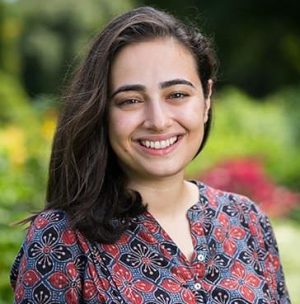To download the episode, subscribe to us in the iTunes store, Spotify Podcasts, and Google Play.
In this episode, Belle interviews Seema Golestaneh, Associate Professor in Near Eastern Studies at Cornell University, about her recent book, Unknowing and the Everyday: Sufism and Knowledge in Iran (Duke University Press, 2023).
In Unknowing and the Everyday (and in our podcast episode), Golestaneh discusses the ambiguities and possibilities surrounding Sufi practices in Iran today. To write her book, she conducted fieldwork across Iran, interviewing authority figures and members of Sufi collectives related to the Nimatullahi order in Isfahan, Kerman, and Tehran. Golestaneh examines a specific thread she found in each group – how leaders and members of Sufi collectives approach the importance and understanding of “unknowing.” In Persian, this sense of unknowing is called ma‘rifat, sometimes translated as gnosis. But Golestaneh finds “unknowing” to be more fitting since the concept is not isolated to intellectual or religious texts, but rather manifests in experiences of the everyday for Sufis she interviewed.
In the podcast, we discuss some of the feelings surrounding unknowing, or “an engaged awareness that we know nothing,” including those associated with the limitations of knowledge. For example, one shaikh Golestaneh interviewed felt melancholic while another was delighted by the fact that they must rest in a sense of unknowing. On the other hand, many Sufis find “unknowing” helpful in dealing with everyday issues and shared with Golestaneh how they operated, thought about, and experienced these notions. We discuss the gender and age dynamics of these experiences, as well as in the Sufi groups themselves.
Sounds and “sensorial affects” were other integral aspects of the practices Golestaneh observed. From the importance of silence, to listening, to music played to draw people to secret meeting places, Golestaneh analyzes how sensorial affects beyond comprehension bring Sufis closer to the divine.
Golestaneh also shows how these Sufi collectives interact (or do not interact) with the state. We discuss a particular episode of “willful amnesia” when authorities in Isfahan destroyed a Sufi meeting place there, and what it meant for the group to choose to forget this destruction instead of push back against it – emphasizing the importance of the people themselves being together in any place, and not the physical space itself.
We end with a discussion of how she approached her research, and interwove her own experiences into Unknowing and the Everyday.
Guest
Seema Golestaneh

Seema Golestaneh is an Associate Professor in Cornell’s Department of Near Eastern Studies. Her research, situated at the nexus of anthropology and religious studies, is focused on expressions of contemporary Islamic thought in the Persian-speaking world. Her first book, Unknowing and the Everyday: Sufism and Knowledge in Iran, was published by Duke University Press in February 2023.
Host
Belle Cheves

Belle Cheves is a senior editor at Ajam Media Collective and a Postdoctoral Research Fellow at Bard College. Her research focuses on the history of family in Qajar Iran, specifically on how transformations of marital practices and affective perceptions of gender, race, and ethnicity shifted understandings of kinship, enslavement, and domestic service over the course of the nineteenth and twentieth centuries.
Credits
Episode No. 40
Release Date: 18 April 2024
Recording Location: New York, NY
Recording Date: 9 October 2023
Produced by Belle Cheves
Audio Editing: Belle Cheves and Nicholas Gunty
Music: Yavaran (Intro: “404 day in heaven;” Outro: “Har Chi”)
Cover Image: Underground shrine, unnamed for anonymity; courtesy of Seema Golestaneh










